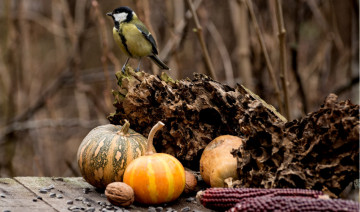
Chill Chirps: Nurturing our Feathered Friends through Cooler Seasons
As the temperatures begin to drop and the leaves change color, it's a clear sign that cooler weather is approaching. Just as we make adjustments to adapt to the changing seasons, it's important to consider our feathered friends and provide them with the support they need during colder months. Here are some essential tips for caring for wild birds as cooler weather approaches:
1. Offer High-Energy Foods:
As the days get shorter and colder, birds require more energy to stay warm. Provide high-calorie foods such as suet, nuts, and seeds. Consider suet cakes with added ingredients like berries or insects for extra nutritional value.
2. Maintain a Consistent Food Source:
Birds come to rely on consistent food sources. Keep your bird feeders well-stocked throughout the fall and winter. This helps them build up reserves for the colder days and ensures they know they can rely on your yard for sustenance.
3. Use Heated Bird Baths:
Fresh water can be hard to find when temperatures drop. Installing a heated bird bath ensures birds have access to water, even in freezing conditions. Birds need water for drinking and bathing, and a heated bath can make a significant difference in their well-being.
4. Provide Shelter:
Strong winds and chilly nights can be harsh on our avian friends. Consider adding roosting boxes or birdhouses with proper ventilation for shelter. These provide a safe and warm place for birds to spend the night or take refuge during inclement weather.
5. Avoid Over-Cleaning Your Garden:
Leaving some dead plants and debris in your garden provides natural foraging areas for birds. Insects and seeds hiding in these areas can be valuable food sources when other options are scarce.
6. Limit or Eliminate Pesticide Use:
Insects are a crucial part of many birds' diets, especially during the colder months when other food sources may be limited. Using pesticides can reduce the availability of these insects. Opt for bird-friendly pest control methods or tolerate a certain level of natural insect activity.
7. Prevent Freezing:
If you're using liquid feed, be cautious of freezing temperatures. Consider switching to dry food during extremely cold periods or investing in feeders designed to prevent food from freezing.
8. Keep an Eye Out for Sick Birds:
Cold weather can stress birds, making them more susceptible to illnesses. If you notice a bird exhibiting signs of distress or illness, contact local wildlife rehabilitators for guidance.
9. Minimize Disturbances:
During colder months, birds need to conserve energy. Minimize disturbances around your bird feeders and bird-friendly areas to allow them to feed without unnecessary stress.
10. Learn About Local Species:
Different bird species have unique needs. Understanding the types of birds in your area and their habits can help you tailor your care practices to suit their requirements.
By taking these steps, you can create a bird-friendly environment that supports our feathered friends as they navigate the challenges of cooler weather. Observing the diverse birdlife in your yard during the fall and winter can be a rewarding experience, and your efforts to care for them make a meaningful difference in their survival.
